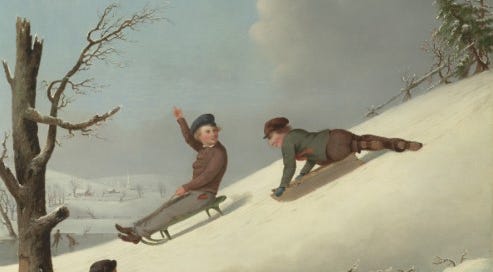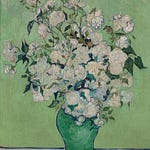The greatest of all toys, when I was a little kid — snow!
We got a lot of it in the 60’s, where we lived. I remember that my father plowed up a huge mound of it outside our house, and I tunneled a hole in it and called it my snow-fort, though it really was kind of cold in there and you couldn’t do much. But I liked it. And I remember, very fondly, sledding down Green Hill, which was a road nobody drove on when it snowed, a steep ninety foot drop that ended in a right angle with a curb and a sidewalk opposite, so that if you couldn’t manage the turn, you’d better abandon the sled — and one time I couldn’t and didn’t, and slammed against the curb and flew off the sled into a picket fence. It was more fun than I can describe.
You might have heard that the Eskimos have forty words for snow, but that isn’t really true. The language spoken on Baffin Island is agglutinative, which means that all kinds of modifiers and grammatical markers get glommed onto the base word, to form something that may count as one word but in English would be a several word description, like snow-in-small-grains or water-snow-in-your-boots, and so on. But it is true that they do describe different kinds of snow, and this is something that people who live in very warm climates don’t have much experience of.
There’s the powdery snow that is light and airy, like the meringue on lemon pie, except that it comes in little flakes; the heavy, wet snow that falls in large flakes and is a beast to shovel; the tiny granular snow that your tires can get stuck in, because it acts like sand; the snow frozen over in a field, with crystals that flash the sunlight back at you in tiny glints of the rainbow, changing color if you move your head an inch or two this way or that. And everybody knows that when it gets cold enough, you can walk through snow and not get wet, and sometimes the snow squeaks under your boots, a little like rubber against rubber.
There’s snowman-building snow, which is also snowball-rolling snow, as when in January of 1978, after a notorious blizzard, the boys in 1901 Hall, whereof I was one, made an enormous snowball eight or nine feet in diameter, and managed to roll it and crush it into the main entryway of our rivals in Henry Hall, opposite the quad, to leave it there to melt. One of the more social of the still-surviving customs at Princeton, this hall-against-hall rivalry! I don’t know if it endures.
Northern poets have long compared the complexion of beautiful and good women to the whiteness of snow, and of course we remember the German folk tale of Snow White, and the wicked queen who hated her. The white of snow is not like the off-white of vanilla, or the gray-white of an egg. It is absolutely pure. But really, what’s happening is that all the crystals of the snow reflect back all the colors, and they unite to form pure white light. Yet in the shadows, snow often looks faintly blue — and that’s a reflection of the blue sky above, as blue light scatters better than the red end of the spectrum does. Snow in the sunlight, with blue above and shadows a fine blue-gray below — a beautiful thing indeed!
Our English word snow, believe it or not, is a cousin to Latin nix, and therefore to French neige and Italian neve, descended from the Latin. It’s easier to see that it’s a cousin of Russian snieg’ and Irish sneachd, because the sn- is still intact. The ancient root had that sn-, but Latin (and Greek) lost it, not just for this word but for all such. Can that happen? Sure! In English, we used to pronounce the k in knee, know, knit, and knight; Chaucer did, as late as 1400. But by Shakespeare’s time, in most parts of England, it was gone. We’d be spelling all those words with just an n now, if it weren’t for the printing press. You get used to seeing kn-, and you keep on spelling the words that way, even though you don’t say them that way anymore. Had they had the press in those days, some poor schoolboy in Italy 3000 years ago would have had to learn that you spell nix as snix, though the s is silent! Technology, making everything easier — well, not everything!
Word & Song is an online magazine devoted to reclaiming the good, the beautiful, and the true. We publish six essays each week, on words, classic hymn, poems, films, and popular songs, as well a weekly podcast, alternately Poetry Aloud or Anthony Esolen Speaks. To support this project, please join us as a free or paid subscriber.
Listen to this episode with a 7-day free trial
Subscribe to Word & Song by Anthony Esolen to listen to this post and get 7 days of free access to the full post archives.














